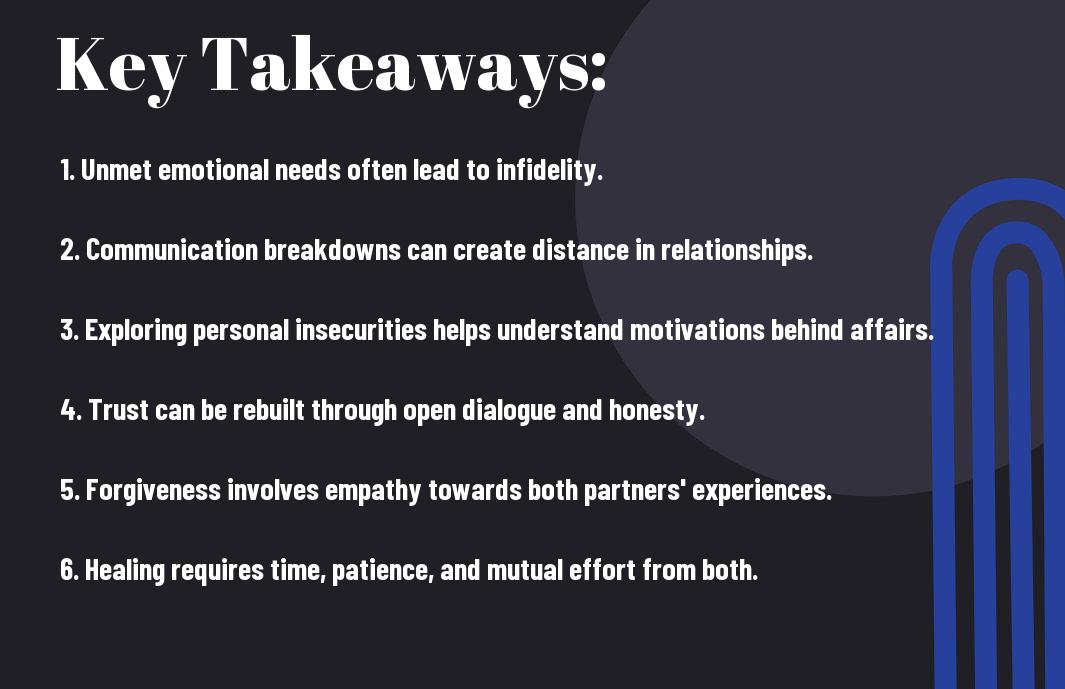Forgiveness is often seen as a gift you give to others, but in the context of infidelity, it is part of your healing journey. Understanding why affairs happen can provide valuable insights into the emotional complexities surrounding relationships. By exploring the factors that lead to infidelity, such as unmet needs, emotional disconnection, or life’s pressures, you can begin to grasp the underlying issues at play. This knowledge equips you with the tools to navigate your feelings, fostering compassion and facilitating true forgiveness, both for the other person and yourself.
Key Takeaways:
- Affairs often stem from unmet emotional needs within a relationship, highlighting the importance of open communication.
- Understanding the underlying reasons for infidelity can pave the way for healing and forgiveness.
- Each partner’s perspective is vital in recognizing the factors that contributed to the affair.
- Forgiveness is a process that involves acknowledging pain, but also choosing to let go for personal peace.
- Addressing individual issues, such as self-esteem or life stressors, can prevent future infidelity.
- Rebuilding trust takes time and commitment from both partners; it requires consistent effort and reevaluation.
- Seeking professional counseling can provide guidance and facilitate crucial discussions about the relationship dynamics.

The Nature of Affairs
While many relationships experience challenges, understanding the nature of affairs is crucial for fostering healing and forgiveness. Affairs typically arise from a combination of unmet needs, emotional disconnection, and opportunities that present themselves in surprising ways. By recognizing these factors, you can begin to comprehend the deeper dynamics at play when infidelity occurs.
Defining Affairs
Affairs are often understood as breaches of trust in a relationship, where one partner engages in a romantic or sexual relationship outside their primary partnership. This can involve emotional attachment or solely physical interactions, and it significantly undermines the commitment shared. You should know that distinguishing an affair isn’t always straightforward, as definitions might vary based on individual perspectives.
Types of Infidelity
Affairs can take various forms, affecting relationships in different ways. Here are common types of infidelity:
- Emotional Affairs
- Physical Affairs
- Cyber Affairs
- One-Night Stands
- Consensual Non-Monogamy
The type of infidelity can greatly influence the path to resolution and healing in your relationship.
| Type | Description |
| Emotional Affairs | Deep emotional connections may form outside the primary relationship. |
| Physical Affairs | These are strictly sexual and focus on physical engagement. |
| Cyber Affairs | Online relationships that may involve flirtation or explicit exchanges. |
| One-Night Stands | Random encounters that don’t involve emotional commitment. |
| Consensual Non-Monogamy | Mutually agreed upon relationships that include other partners. |
Also, understanding the types of infidelity can give you insight into your situation and needs within your relationship. It’s important to recognize that each type carries its own implications, influencing how you and your partner feel about trust and commitment. Some might feel more betrayed by an emotional affair, while others may perceive physical infidelity as the greater violation. The path to healing often depends on the nature of the affair encountered.
| Type | Implication |
| Emotional Affairs | Breach of deep emotional trust. |
| Physical Affairs | Undermines physical exclusivity. |
| Cyber Affairs | Challenges intimacy in digital age. |
| One-Night Stands | Denotes a lack of commitment. |
| Consensual Non-Monogamy | Presents different relationship dynamics. |
Psychological Triggers
Even as you navigate the complex emotions surrounding infidelity, understanding the psychological triggers behind affairs is necessary for healing. These triggers often stem from unmet needs or unresolved conflicts. For guidance on whether to move forward, check out Should You Forgive an Affair?. Recognizing these factors can help pave the way for forgiveness and personal growth.
Emotional Factors
Triggers often emerge from a range of emotional factors, including:
- Low self-esteem
- Feelings of neglect
- Emotional disconnection
Any of these issues can lead someone to seek affirmation and connection outside their relationship.
Situational Influences
Psychological influences also encompass situational factors that can lead to infidelity. Stressful life events, such as a job loss or personal tragedy, can create an environment where individuals are more susceptible to seeking solace in an affair. The presence of opportunistic situations, like traveling for work or social gatherings, can further exacerbate this risk, as the boundaries within your relationship may feel less defined during turbulent times.
Another aspect to consider is that underlying psychological issues, such as depression or anxiety, can significantly impact how you respond to life’s challenges. When you are feeling overwhelmed, an affair might appear as a temporary escape, providing a sense of excitement and relief. The danger lies in potential long-term consequences that could follow. Understanding these situational influences helps you take proactive steps to foster a healthier emotional landscape in your relationship.
Impact on Relationships
After an affair, relationships often undergo significant turmoil, with emotional scars that can last for years. The act of betrayal may lead to feelings of grief, anger, and confusion, ultimately challenging the very foundation of trust that partners once shared. With an understanding of these impacts, you can navigate the complexities of rebuilding your relationship or determining its future direction.
Trust and Betrayal
Betrayal shatters the sense of security in a relationship, eroding the bedrock of trust. It is imperative to recognize that trust, once fractured, requires intentional effort and time to mend. As you process these feelings, it’s common to experience doubt about your partner’s commitment and intentions moving forward.
The Role of Communication
By fostering open and honest communication, you can pave the way for healing after an affair. This involves sharing your thoughts, feelings, and concerns in a safe space, where both partners feel heard and understood. Effective dialogue helps to clarify misunderstandings, strengthen your emotional connection, and rebuild trust.
At the heart of meaningful communication lies vulnerability and honesty. It is vital to express not only your pain and anger but also your hopes for the relationship’s future. Establishing consistent check-ins can also keep emotions at bay and encourage ongoing dialogue. Practice active listening, as this demonstrates your commitment to understanding your partner’s perspective. When both of you are committed to this process, it can lead to transformative growth and a renewed bond that is stronger than before.
Path to Forgiveness
Your journey toward forgiveness requires patience and understanding. It involves recognizing the emotions associated with betrayal and letting go of the past. By actively working through your feelings, you can find a sense of peace and rebuild trust in a way that feels right for you.
Understanding Emotions
Behind every affair lies a complex web of emotions, including hurt, anger, and confusion. Acknowledging these feelings is vital for healing. You may find that grappling with your emotions allows you to articulate your pain and gradually transform your experience into one of healing and growth.
Strategies for Healing
Across your path to healing, various strategies can help you regain your emotional balance. Engaging in open communication with your partner, seeking professional counseling, and practicing self-care can be beneficial. These steps not only promote understanding but also foster a supportive environment for recovery.
To truly heal from the wounds of infidelity, you must develop a personalized approach. Try to establish a safe space for dialogue where both you and your partner can express your thoughts. Therapy can assist in navigating complex emotions and insights into underlying issues. Additionally, prioritizing self-care, such as regular exercise or mindfulness practices, can enhance your resilience. Allow yourself to grieve the loss of trust while also being open to forgiveness as an empowering choice, setting the stage for renewed connections.

Rebuilding Trust
Once again, the process of rebuilding trust takes time, patience, and commitment from both you and your partner. It’s vital to work through the lingering feelings of betrayal while fostering an environment where open communication can thrive. Both partners need to actively participate in nurturing their relationship, ensuring that trust is restored through consistent honesty and transparency.
Open Dialogue
After an affair, establishing open dialogue is vital for both you and your partner. This communication helps you explore feelings, thoughts, and concerns that arise during the healing process. By creating a safe space where both of you can express yourselves without judgment, you pave the way for deeper understanding and connection.
Setting Boundaries
Beside encouraging communication, setting boundaries is vital for rebuilding trust. Clearly discussing what is acceptable and what is not in your relationship fosters a sense of safety and respect. This step not only helps you both define the new dynamics of your partnership but also reinforces your commitment to healing together.
In fact, establishing clear boundaries can significantly reduce the risk of future misunderstandings or conflicts. You should openly discuss your expectations regarding communication, friendships, and social interactions moving forward. Being transparent about what behaviors may trigger insecurities can lead to a stronger, more trusting relationship. Setting these bonds not only protects your feelings but also encourages a mutual commitment to respect each other’s emotional well-being.

Seeking Professional Help
Now that you understand the complexities surrounding affairs, seeking professional help can be an important step toward healing. Professionals can provide a safe space to explore your feelings, facilitate open communication, and guide you through the recovery process. A therapist experienced in relationship dynamics can help you identify underlying issues and develop strategies for moving forward together or apart.
Counseling Options
The array of counseling options available can greatly influence the healing journey. Individual therapy can help you process your feelings, while couples therapy allows both partners to address issues collectively. Additionally, support groups provide a space for shared experiences, helping you feel less isolated as you navigate this challenging period.
When to Seek Help
Above all, knowing when to seek help can make a significant difference in your healing journey. If you find persistent feelings of anger, sadness, or confusion about the affair, or if communication breaks down between you and your partner, it may be time to consider professional support. Early intervention can prevent more extensive emotional damage and promote healthier coping mechanisms.
At times, it can be difficult to recognize when you need help, but there are key indicators to watch for. If your emotions feel overwhelmingly intense, seeking help can guide you towards emotional stability. If your relationship is consistently marked by conflict, professional intervention can open pathways to better communication. Don’t dismiss feelings of hopelessness, as these can escalate without proper support. Engaging a therapist can provide you with valuable tools to navigate your emotions and foster understanding, leading to the chance of a healthier relationship dynamic.
To wrap up
Upon reflecting on the reasons behind why affairs happen, you gain valuable insights that can pave the way for forgiveness. Understanding the underlying motivations, emotional needs, and vulnerabilities that contribute to infidelity allows you to contextualize the experience, making it easier to navigate your feelings. This knowledge not only aids in healing but also empowers you to foster open communication and rebuild trust in your relationships. Embracing this journey is imperative for personal growth and restoring connection, ultimately guiding you toward a more fulfilling relational landscape.
FAQ
Q: What are some common reasons that lead to infidelity in a relationship?
A: Infidelity can occur for various reasons, often intertwined with emotional, psychological, and situational factors. Some common reasons include a lack of emotional connection, unresolved conflicts, unmet needs, boredom, and seeking validation or excitement outside the relationship. Sometimes, individuals may also have a poor understanding of commitment or may not be ready for a long-term relationship. Addressing these underlying issues can help couples work toward healing and understanding.
Q: How can understanding the reasons behind an affair help in the healing process?
A: Understanding the motivations and triggers that led to the affair can provide clarity for both partners. It allows the hurt partner to see the human side of their spouse’s actions, making it easier to process feelings of betrayal. For the unfaithful partner, recognizing their behavior’s underlying causes is crucial for personal growth and preventing future infidelity. This mutual understanding creates a foundation to rebuild trust and foster a healthier relationship moving forward.
Q: Is forgiveness possible after an affair, and how can it be achieved?
A: Yes, forgiveness is possible, though it requires time, effort, and open communication. The process involves acknowledging the pain caused by the affair, expressing feelings honestly, and giving each other space to heal. Both partners should actively engage in discussions about the affair, exploring the emotions involved. Working together to establish new relationship dynamics and setting clear boundaries can aid in the journey toward forgiveness, ultimately leading to a stronger bond.
Q: What steps can couples take to prevent future infidelity?
A: Prevention of future infidelity begins with open communication about needs, desires, and concerns within the relationship. Couples should create a safe space for discussion, regularly checking in with each other emotionally and physically. Building trust is also crucial; this can be achieved by setting boundaries and being transparent. Seeking couples therapy or engaging in relationship-building activities can further strengthen the relationship, making it less likely for either partner to look outside for fulfillment.
Q: How does seeking professional help contribute to understanding infidelity?
A: Professional help, such as couples therapy, often provides a structured environment for partners to express their feelings and experiences safely. A trained therapist can guide discussions about the affair, helping both partners to articulate their emotions and understand each other’s perspectives. Therapy can also offer tools for improved communication, conflict resolution, and strategies to address underlying issues, ultimately fostering a deeper understanding and paving the way for healing and renewed commitment.
